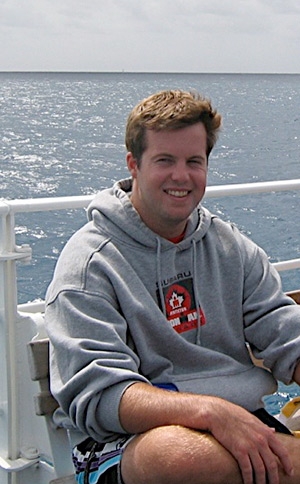 Professor Michael Beman, with the School of Natural Sciences, became the 13th faculty member to win a National Science Foundation (NSF) Faculty Early Career Development (CAREER) award since the campus opened.
Professor Michael Beman, with the School of Natural Sciences, became the 13th faculty member to win a National Science Foundation (NSF) Faculty Early Career Development (CAREER) award since the campus opened.
The grant provides nearly $700,000 over the next five years to help the UC Merced life sciences professor further his studies of oceanic hypoxic and anoxic (low- and no-oxygen) “dead zones.”
“There are microbes that can consume the oxygen all the way down to zero, and it appears there are some organisms that thrive in low- or no-oxygen environments because of specialized enzymes,” Beman said. “We need to look at the microbes at a cellular level and understand which are competitive and why.”
Beman joins professors Asmeret Asefaw Berhe, Elliott Campbell, Miguel Á. Carreira-Perpiñán, Alberto Cerpa, Sayantani Ghosh, Linda Hirst, Christopher Kello, Dong Li, Kevin Mitchell, Shawn Newsam, Lin Tian and Ming-Hsuan Yang in being recognized for outstanding and critical research.
“Professor Beman’s highly interdisciplinary research combines microbial ecology, biogeochemistry and climate science,” School of Natural Sciences Dean Juan Meza said. “His most important work has led to a better understanding of the global nitrogen cycle, and in particular, the process of nitrification in the oceans, which has global implications on oceanic ecology and climate change. Understanding the relationships between all of these interactions is critical in studying the effects of climate change. Beman is another one of our junior professors who has gone far beyond the call of duty, even by UC Merced standards.”
In the lab, Beman and his students will work on manipulating oxygen levels in water and look at whether the microbes accelerate or slow the loss of oxygen in the water.
Part of the project will also include two month-long trips aboard a research ship off the coast of Mexico to study the large and expanding deep Pacific low-oxygen zone. Beman said graduate and undergraduate students will be able to go, and, possibly, some K-12 science teachers from the Merced area. He hopes for a place aboard the Scripps Institution of Oceanography’s newest research ship, the R/V Sally Ride, named after the late astronaut.
“We know these zones are expanding, some naturally and some because of climate change, and so we need to understand them in greater detail to understand their expansion,” Beman said.
On the surface, these areas of the oceans host extremely productive fisheries. But all that life means more organic matter sinking into the depths, which is what many of the bacteria feed on. And the more the bacteria feed, the more oxygen they consume, which kills off other life forms until the hypoxic zones become biological deserts — at least for larger forms of life.
Many factors contribute to hypoxia, from polluted runoff from human activities to seasonal changes in ocean temperatures. But no sea is immune to them, and they are found around the world.
“The more we study these zones, the more complexity we find,” Beman said. “But we really need to understand all the different parts and how they fit together, because a lot of what happens in the oceans affects the rest of the globe.”
CAREER awards are given to junior faculty members who exemplify the role of teacher-scholars through outstanding research, excellent education and the integration of education and research within the context of the mission of their organizations, the NSF said.
Beman said the CAREER award is an honor that allows him to tackle a complex subject in depth.
“The NSF gives you five years, recognizing that some problems simply take more time to solve,” he said.